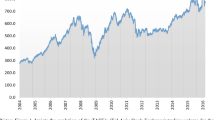Abstract
This study examines the positive Monday returns detected in the stock market during the 1988–1998 period and finds that (a) the positive Monday returns are concentrated in the first and the third weeks of the month, and (b) they are related to the increasing trading activities of institutional investors.
Similar content being viewed by others
References
Brusa, J., P. Liu and C. Schulman, "The Weekend Effect, 'Reverse' Weekend Effect and Firm Size." The Journal of Business Finance and Accounting 555–570 (2000).
Brusa, J., P. Liu and C. Schulman, "The Weekend and Reverse Weekend Effects: An Analysis by Month-of-the-Year, Week-of-the-Month, and Industry." The Journal of Business Finance and Accounting 863–890 (2003).
Cadsby, C. and M. Ratner, "Turn-of-the-Month and Pre-Holiday Effects on Stock Returns: Some International Evidence." Journal of Banking and Finance 16, 479–509 (1992).
Chang, E., M. Pinegar and R. Ravichandran, "International Evidence on the Robustness of the Day-of-the-Week Effect." Journal of Financial and Quantitative Analysis 497–513 (1993).
Chang, E., M. Pinegar and M. Schachter, "Interday Variations in Volume, Variance, and Participation of Large Speculators." Journal of Banking and Finance 797–810 (1997).
Chordia, T., R. Roll and A. Subrahmanyam, "Market Liquidity and Trading Activity." Journal of Finance 501–530 (2001).
Gu, A., "The ReversingWeekend Effect: Evidence from the U.S. Equity Markets." Review of Quantitative Finance and Accounting 22, 5–14 (2004).
Hensel, C. and W. Ziemba, "Investment Results from Exploiting Turn-of-the-Month Effects." Journal of Portfolio Management 17–23 (1996).
Kamara, A., "New Evidence on the Monday Seasonal in Stock Returns." Journal of Business 63–84 (1997).
Lakonishok, J. and E. Maberly, "The Weekend Effect: Trading Patterns of Individual and Institutional Investors." Journal of Finance 231–243 (1990).
Liano, K. and J. Lindley, "An Analysis of theWeekend EffectWithin the Monthly Effect." Review of Quantitative Finance and Accounting 419–426 (1995).
Mehdian, S. and M. Perry, "The Reversal of the Monday Effect: New Evidence from US Equity Markets." Journal of Business Finance and Accounting 1043–1065 (2001).
Newey, W. and K. West, "A Simple, Positive Semi-Definite, Heteroskedasticity and Autocorrelation Consistent Covariance Matrix." Econometrica 703–708 (1987).
Ogden, J., "The End of the Month as a Preferred Habitat: A Test of Operational Efficiency in the Money Market." Journal of Financial and Quantitative Analysis 22, 497–513 (1987).
Ogden, J., "Turn-of-the-Month Evaluations of Liquid Profits and Stock Returns: A Common Explanation for the Monthly and January Effects." Journal of Finance 45, 1259–1272 (1990).
Pierce, P., The Dow Jones Averages 1885-1990. Irwin, 1991.
Wang, K., Y. Li and J. Erickson, "A New Look at the Monday Effect." Journal of Finance 2171–2186 (1997).
Author information
Authors and Affiliations
Rights and permissions
About this article
Cite this article
Brusa, J., Liu, P. The Day-of-the-Week and the Week-of-the-Month Effects: An Analysis of Investors' Trading Activities. Review of Quantitative Finance and Accounting 23, 19–30 (2004). https://doi.org/10.1023/B:REQU.0000037062.21050.3b
Issue Date:
DOI: https://doi.org/10.1023/B:REQU.0000037062.21050.3b




